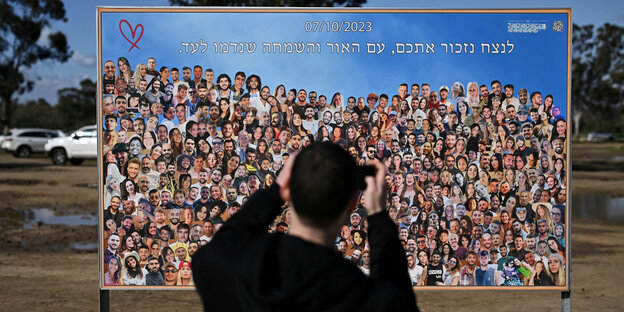Former Israeli ambassador Jeremy Issacharoff talks about the war against Hamas, hostage negotiations and the aftermath of the conflict.

A man photographs a plaque commemorating the victims of the Hamas attack on the Re'im music festival on October 7. Photo: Dylan Martínez/Reuters
taz: Israel and Hamas are holding difficult negotiations over a ceasefire and the release of the more than 100 hostages still held in the Gaza Strip. At the same time, the Israeli army threatens to advance towards the city of Rafah, on the border with Egypt. Wouldn't an advance on Rafah jeopardize the agreement?
Issacharoff: Military operations are part of the negotiations. They are increasing pressure on Hamas. In my opinion, the first hostage release was also the result of a combination of military pressure and talks.
More than a million displaced people gather in Rafah. Federal Foreign Minister Annalena Baerbock said an offensive there would be “unjustifiable.”
Hamas has always built its strategies on our weaknesses. They know we don't want to harm the civilians on the other side. They don't care if Palestinians die as collateral damage. I don't know if there is a simple and effective strategy against this. Israel is taking all possible measures to avoid civilian casualties. But they can hardly be ruled out when an enemy has penetrated so deeply into civilian infrastructure.
Jeremy Issacharoff, retired Israeli ambassador, was in the Israeli foreign service for 40 years. From 2017 to 2022 as ambassador to Germany. Previously as ambassador in Washington, where he experienced hostage negotiations surrounding kidnapped soldier Gilad Schalit, and at the United Nations in New York.
Due to the army's actions in combination with statements by Israeli politicians, the accusation of genocide is even being heard before the International Court of Justice (ICJ).
In my opinion, it is a shame that South Africa represents Hamas terror there. People say things in the heat of the moment that they would say differently in retrospect. However, I do not want to justify the statements on which South Africa's claim is based. Many of them were absurd and some were made by people who did not have the authority to make them. At the end of the day, what matters is that Prime Minister Benjamin Netanyahu has clearly said that our enemy is Hamas and that we will not expel the Palestinians.
Can Hamas be defeated militarily?
An ideology can hardly be combated militarily. But we are talking about ending a military threat. This is very possible with the destruction of Hamas's military capabilities. However, in my opinion, the release of the hostages should be the top priority at this time. The fact that so many Israelis remain in the hands of Hamas is a huge challenge for Israeli society. Only when we have everyone back can we think about everything else.
Last weekend, hundreds of participants at a conference in Jerusalem called for Jewish settlements in the Gaza Strip. Twelve ministers also included among the participants a third of the current government coalition.
I think the idea of reoccupying Gaza is absolutely ridiculous. Two million Palestinians live there and we will not expel them. Above all, the timing was completely inappropriate. We are in the middle of one of the worst crises for our national security. While our soldiers fight in Gaza, there are repeated bombings on the northern border. Tensions are rising in the West Bank. Houthi attacks and now US retaliation against Iranian-backed militias in the region. At the same time, no one is talking about the fact that Iran has made more progress than ever in its nuclear program.
However, far-right National Security Minister Itamar Ben-Gvir has threatened to leave the government if a deal is reached with Hamas.
Well, then you should go. These people have no idea how important our strategic partnerships are. I have worked for the Israeli government in New York, Washington and Berlin. We need our allies. We must not face this challenge alone on multiple fronts at the same time.
However, Netanyahu also repeatedly snubs the US president and rejects talks on the future of Gaza.
Israel needs new elections and I suppose the polls suggest that the political right would emerge weakened. October 7, the worst day for Jews since the Holocaust, was proof that their logic and policies did not work.
So far, the government has proven to be relatively stable, despite or because of the war. How could there be new elections?
My feeling is that new elections could be held sooner rather than later. I don't know how long opposition leader Benny Gantz and former chief of staff Gadi Eizenkot will remain in the war cabinet, and anti-government protests appear to be increasing. Once the hostage situation ends and the fighting subsides, calls for new elections are likely to increase.
What could a new government achieve?
Everyone in Israel should have understood after October 7: if we emerge from this crisis without a political solution to the Palestinian problem, then Hamas has won. That is exactly what he wanted to prevent with his attack: normalization between Israel and Saudi Arabia and the possibility of any understanding. What we need are two things: a political horizon and an agreed path to get there. Only then can we develop a plan for Gaza. That is why the Americans and Germans insist on two states for two peoples, even though they know that this plan cannot be implemented tomorrow.
Is there currently any will in Israeli society to find a solution?
Due to the atrocities of October 7 and the hostage taking, it was burned into the Israeli conscience: Hamas and others want to kill us. This makes conversations about the idea of a political solution to coexistence extremely difficult. However: we owe it to our children. They should no longer have to put themselves at risk of being kidnapped or killed as soldiers.